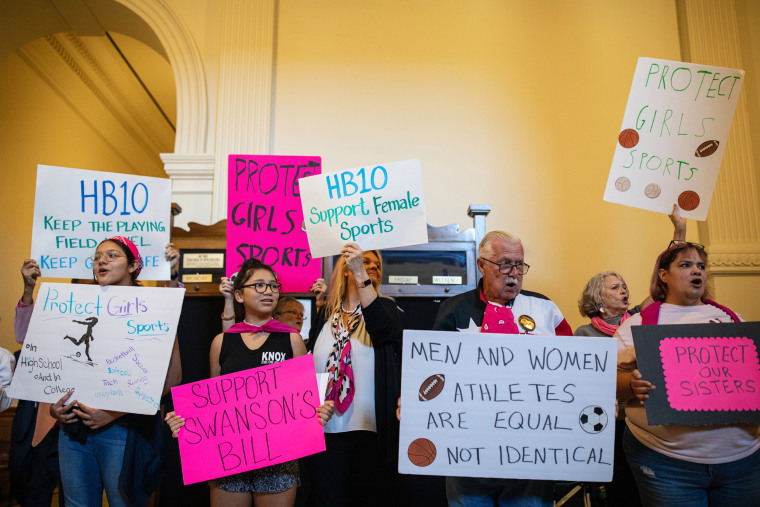As state legislatures around the country pursue anti-LGBTQ legislation in what advocates have said is the “worst year” for LGBTQ rights in modern history, a report released Thursday highlights how cities are quietly moving the needle in the opposite direction.
In their 10th annual Municipal Equality Index, or MEI, two LGBTQ advocacy groups, the Human Rights Campaign and the Equality Federation, evaluated 506 municipalities — including the country’s 50 state capitals and its 200 largest cities — on how lesbian, gay, bisexual, transgender and queer people are included in their local laws, policies and services.
They found that over the last decade, the average MEI score rose 44 percent to 85 points this year from a score of 59 points in 2012, the report's inaugural year.
"I literally gasped when I did the math," said the founding author of the MEI, Cathryn Oakley, the state legislative director for the Human Rights Campaign. "The things that those points represent, they're things that matter for people's lives."
To boost their scores, cities would have had to implement or improve upon any of the MEI's 49 criteria, which include nondiscrimination protections, pro-LGBTQ policies or benefits for municipal employees and city leaders.
But while the report shows an expansion of LGBTQ rights in cities and towns around the country, its findings coincide with the pursuit of hundreds of bills that target LGBTQ people in state legislatures.
The bulk of the state legislation proposed this year has been aimed at transgender minors, including bills that seek to prohibit trans students from competing on school sports teams that align with their gender identities and those that restrict transition-related health care.
Other bills include a requirement that parents sign off on any mention of gender identity or sexual orientation in school curriculums.
Twenty-five anti-LGBTQ bills have been signed into law, including measures in Tennessee, Texas and Arkansas, according to the Human Rights Campaign.
Oakley reasoned that the divide between state legislatures and city governments comes down to the motives of city officials compared to those of state officials, which she described as "less aspirational" and "practical."
“They’re used to coming up with pragmatic solutions that are going to benefit people now,” she said of city officials. “They don’t get as bogged down in the hyperbole and misinformation.”
This year, city officials across the country have continued to advance LGBTQ rights as the wave of anti-LGBTQ legislation makes its way through state legislatures.
In May, the Pittsburgh City Council passed a bill that adds LGBTQ-owned businesses to the list of minority- and women-owned businesses eligible for government aid and support. The City Council in Columbia, South Carolina, passed a ban on conversion therapy for minors in June. And several cities in North Carolina passed nondiscrimination ordinances throughout the year, with Raleigh doing so just last month.
Thursday's report also found that cities in states with anti-LGBTQ laws or without LGBTQ protections have still moved the needle on queer rights. It found that 72 cities earned MEI scores over 85 points this year, despite hailing from states without nondiscrimination statutes that explicitly protect sexual orientation and gender identity.
Other highlights from the report include a rise in the proportion of municipalities scoring a perfect 100 — 22 percent this year, compared to 8 percent in 2012 — and a year-over-year rise in the average score of every region of the country.
However, Gabriele Magni, an assistant professor of political science at Loyola Marymount University in Los Angeles, who was not involved with the report, argued that because the study pools data from cities with big populations, which generally have large pockets of Democratic voters, the findings may be somewhat skewed.
"We should be happy, but we should not be complacent about this. This is probably further evidence of the increasing divide between cities and rural areas when it comes to LGBTQ rights," Magni said. "Cities governed by Democrats are making progress. State legislatures where rural areas have more voice, where Republicans have more power, they're going in the opposite direction."
Eight cities in the report, including Florence, Alabama; Jonesboro, Arkansas; and Southaven, Mississippi, scored an average of zero points.

